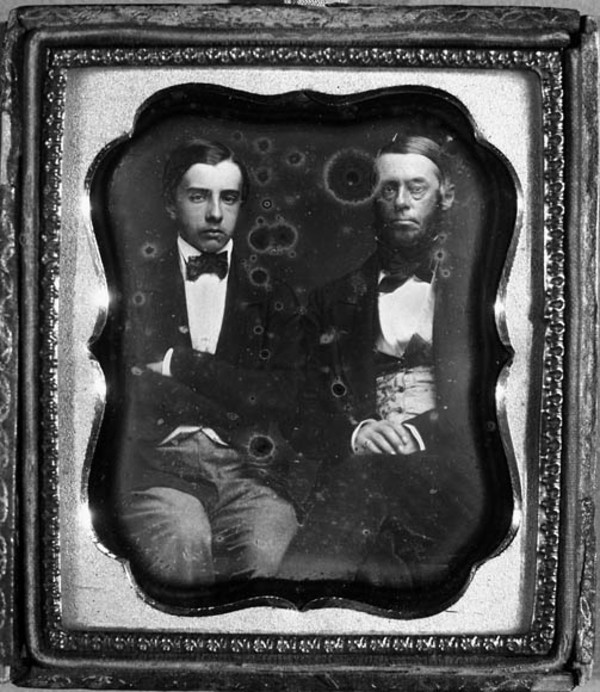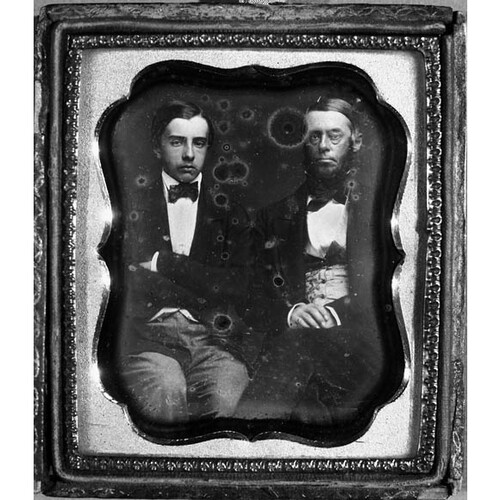BOUCHER DE LA BRUÈRE, PIERRE-CLAUDE, doctor and public servant; baptized 28 Sept. 1808 at Boucherville, eldest son of Colonel René Boucher de La Bruère and Marie-Julie Weilbrenner; d. 19 May 1871 at Saint-Hyacinthe, Que.
Almost nothing is known about Pierre-Claude Boucher de La Bruère’s youth. On 11 March 1829 he was licensed to practise medicine. On 3 Oct. 1836, at Boucherville, he married Marie-Hippolyte de La Broquerie. He carried on his profession at Saint-Hyacinthe, where he lived for some years prior to the disturbances of 1837, and where he was to end his life.
The troubled period that Lower Canada went through during the decade after 1830 was certainly the fullest one in his life. In 1838, suspected of being in sympathy with the Patriotes, he was arrested and taken to prison. Two years earlier nobody would have believed such an event possible. He was the parish organist, he loved sketching and the theatre, and he spent his leisure time talking with the teacher-priests and students of the college of Saint-Hyacinthe, who spoke highly of his sensibility and sense of humour. Before the resolutions of Lord John Russell, in the spring of 1837, La Bruère scarcely ever took part in the demonstrations that brought together the Patriotes of Saint-Hyacinthe and the surrounding districts. He was none the less greatly exercised over the turn of events.
As a citizen of Saint-Hyacinthe he found himself at the centre of the storm that burst upon Lower Canada. As a doctor, he shared with too many confrères a clientele whose incomes were low. As a friend of the college of Saint-Hyacinthe, where five members of the Papineau family and two sons of Wolfred Nelson* were studying, he exchanged and shared with young teachers his hopes and fears as to the nation’s future. No doubt it was recalled to him that his grandfather had fought at Châteauguay, and that heroes’ blood flowed in his veins.
During the pre-revolutionary period, from April to November 1837, Boucher de La Bruère’s restraint progressively gave place to impatience and exasperation. He was to be found at the different charivaris inflicted upon the opponents of the Patriotes, he took part in the planting of the fir-tree in May before the church at Saint-Hyacinthe, in honour of Louis-Joseph Papineau, and he walked through the streets of the municipality dressed in homespun. In October 1837 he was present at the assembly of the six counties. He is said to have taken up arms in November, although we do not know the exact role he played in the events at Saint-Charles and Saint-Denis.
A year later, when renewed restlessness occurred in connection with the secret association of Frères-Chasseurs [see Nelson], Boucher de La Bruère was apprehended and taken to prison in Montreal. His arrest is no doubt explained by the fact that on 2 November of the preceding year he had met Édouard-Élisée Malhiot, one of the Patriote leaders who had arrived from the United States. Furthermore, he was suspected of assisting the Patriotes by using the funds of the Banque Canadienne, which he had established at Saint-Hyacinthe in 1835–36, in partnership with one of his brothers-in-law, Charles-Adrien Pacaud, who was himself a supporter of the Patriotes. This bank was to cease operation in 1839. On 29 Dec. 1838 La Bruère was released without trial.
After the rebellion it seems that the doctor reverted to a more moderate line of political thinking, one that was, indeed, more in conformity with his temperament. On 15 Sept. 1847 he was appointed major of the 5th battalion of the Saint-Hyacinthe militia. In 1849 he took a vigorous stand against the agitation for annexation to the United States. After that we know nothing further about his political ideas and activities.
On 22 Dec. 1862 he was appointed by the government to the post of inspector of crown land offices, and on 29 Oct. 1867 to that of director of colonization in Lower Canada. In 1869 he accepted in addition the office of inspector of prisons [see Terence Joseph O’Neill]. Despite his duties he nevertheless continued to concern himself with the life and future of his region. In 1853 he had been president of the Saint-Jean Baptiste society of his municipality. He took part in the organization of the Société de Colonisation de Saint-Hyacinthe, which directed a number of families towards Compton County.
La Bruère died at Saint-Hyacinthe, and was mourned by his wife and only son, Pierre-René-Joseph-Hippolyte*, who later became a member of the Legislative Council and superintendent of public instruction.
“Inventaire des documents relatifs aux événements de 1837 et 1838, conservés aux archives de la province de Québec,” APQ Rapport, 1925–26. C.-P. Choquette, Histoire de la ville de Saint-Hyacinthe (Saint-Hyacinthe, Qué., 1930). Fauteux, Patriotes, 123–24.
Cite This Article
Yves Roby, “BOUCHER DE LA BRUÈRE, PIERRE-CLAUDE,” in Dictionary of Canadian Biography, vol. 10, University of Toronto/Université Laval, 2003–, accessed January 1, 2026, https://www.biographi.ca/en/bio/boucher_de_la_bruere_pierre_claude_10E.html.
The citation above shows the format for footnotes and endnotes according to the Chicago manual of style (16th edition). Information to be used in other citation formats:
| Permalink: | https://www.biographi.ca/en/bio/boucher_de_la_bruere_pierre_claude_10E.html |
| Author of Article: | Yves Roby |
| Title of Article: | BOUCHER DE LA BRUÈRE, PIERRE-CLAUDE |
| Publication Name: | Dictionary of Canadian Biography, vol. 10 |
| Publisher: | University of Toronto/Université Laval |
| Year of publication: | 1972 |
| Year of revision: | 1972 |
| Access Date: | January 1, 2026 |




